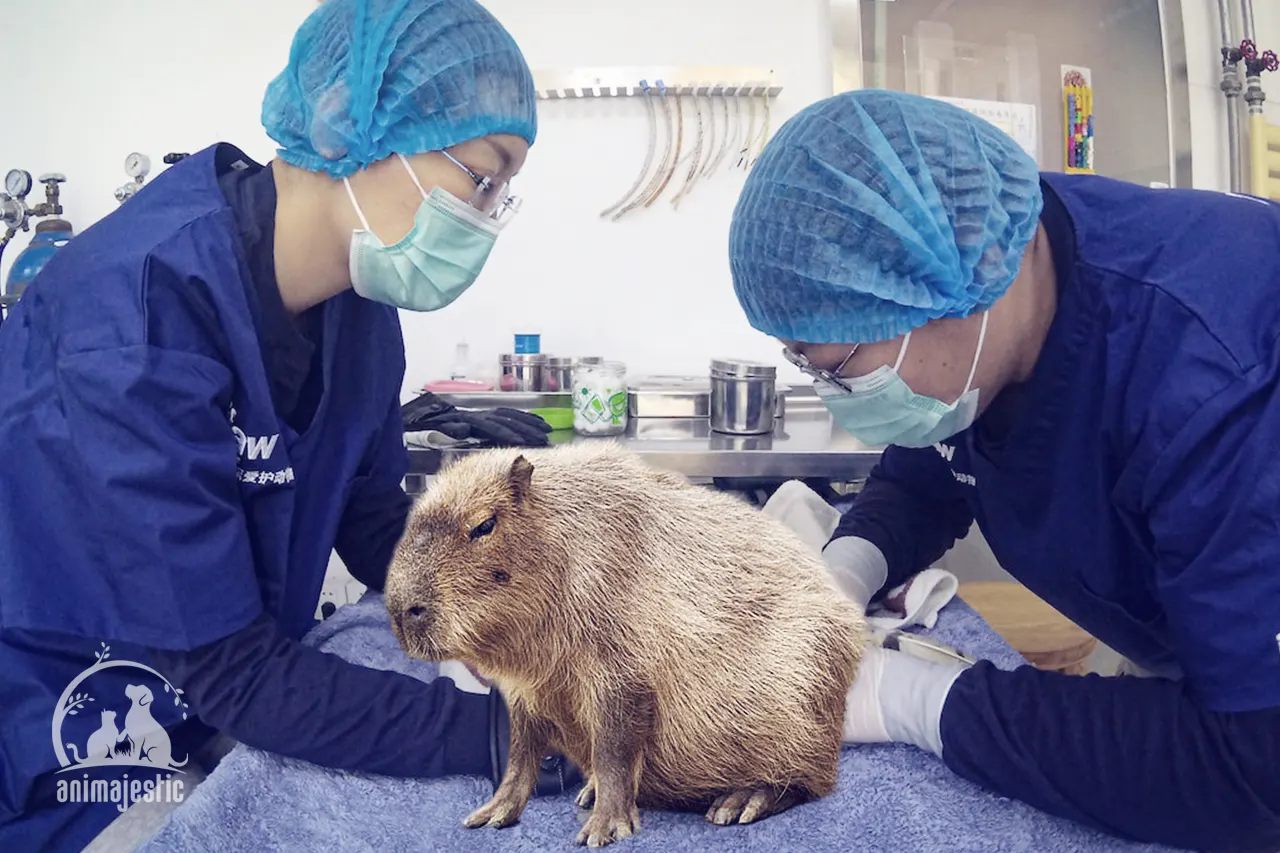Health issues in capybaras can vary widely due to their diverse habitat, unique biology, and increasing popularity as pets. Capybaras, the largest rodents on the planet, are known for their gentle natures and curious personalities.
However, their ownership comes with its fair share of responsibilities, primarily related to their health and well-being. Whether you’re a potential capybara owner or already have one of these captivating creatures, understanding common health issues is essential.
To ensure the health and happiness of these incredible creatures, it’s paramount for potential owners to understand the common health issues in capybaras, along with strategies for prevention and treatment.
Common Health Issues in Capybaras
Below are the various health issues capybaras face and how to make the lives of these charismatic rodents and their human caretakers healthier and happier.
Dental Concerns
If you’ve ever seen a capybara cracking open fruits or crunching on stems, you’ve witnessed the impressive power of their continually-growing teeth.
While these chompers play an essential role in breaking down their food, they can also pose health issues if not managed well.
- Malocclusion or misalignment of teeth occurs when the capybara’s diet lacks the robust roughage needed for their instinctive gnawing action, which naturally grinds down the teeth.
- Symptoms include weight loss (since they struggle to eat), drooling, malnutrition and injuries inside the mouth.
- Regular dental check-ups by veterinarians and providing a diet of high-fiber hay, grass, bark, or twigs can help prevent this issue.
Pesky Parasites
Being natural explorers, capybaras interact with various environments where they’re prone to contracting parasites both internal, like worms, and external, such as fleas or ticks.
- Internal parasites primarily attack the capybara’s digestive system, causing distressing symptoms like diarrhea, lethargy, and in severe cases – a potbelly.
- External parasites lead to uncomfortable itching, hair loss, and infections from constant scratching.
- Regular screening for parasites and maintaining a clean living area for your capybara are effective strategies for managing these creepy crawlies.
Nutritional Necessities
Offering a nutritionally balanced diet is among the foremost ways to uphold your capybara’s health.
- Vitamin C deficiency: Reminiscent of humans, capybaras can’t naturally produce vitamin C. Hence, a deficiency can lead to a condition known as scurvy characterized by weakness, swollen joints, and anemia.
- Including fresh fruits and vegetables in their diet, rich in vitamin C, like bell peppers, guavas, and strawberries, can manage this deficiency.
- Calcium and phosphorus imbalance: An imbalanced diet can lead to metabolic bone disease, which stunts growth and leads to fragile bones.
- A veterinarian can help design a diet that meets your capybara’s needs.
Emotional and Environmental Stress
Isolation can cause significant emotional stress to these social creatures, leading to a weakened immune system, poor fertility, and behavioral changes.
- Heat stress is also a potential issue as capybaras are adapted to hot, humid climates and an overexposure to heat can lead to exhaustion and dehydration.
- Integrating more social interaction, offering a shaded, cool environment and access to water for swimming can help alleviate these health concerns.
The Burden of Excess – Obesity
Like in most animals, and indeed humans, a sedentary lifestyle and an overindulgence in foods can lead to obesity in capybaras, attributing to a myriad of health issues.
- It increases the capybara’s risk of heart diseases, joint stress, and reduces their overall lifespan.
- Regular exercise, portion control, and regular health checks are effective preventive measures.
Navigating the journey of understanding capybara health issues can seem extensive and overwhelming. However, through timely recognition and appropriate action, these health challenges can be effectively managed.
Owning capybaras as pets is no small task – but growing informed, understanding them better, and watching them thrive can undoubtedly offer immeasurable joy and fulfillment.
This guide offers a comprehensive overview of the various health challenges capybaras face, strategies to tackle them and create a harmonious, healthy ecosystem for these fascinating creatures to thrive in.
Always remember to consult with a trained veterinarian for precise guidance tailored to your capybara’s needs.
Let’s strive to make the world a healthier place for our beloved capybaras—one informed step at a time.
